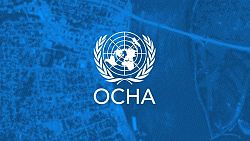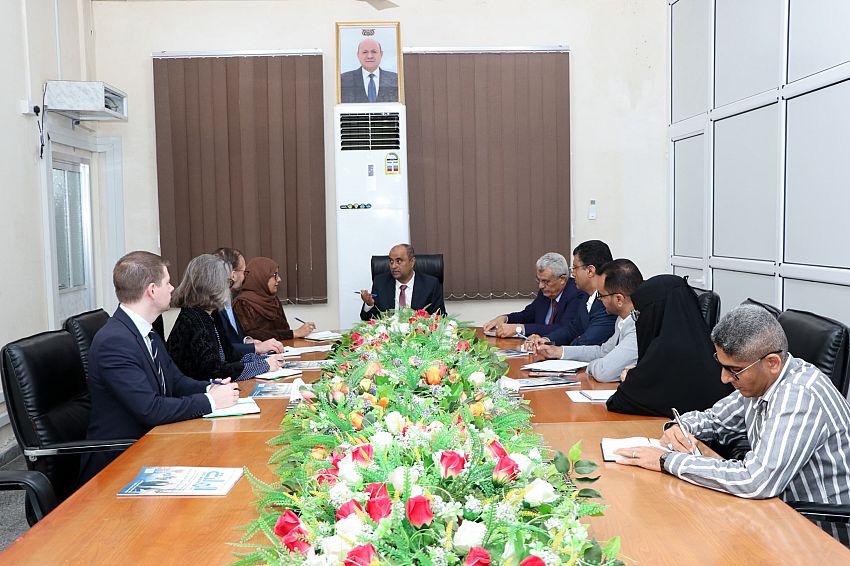
Yemeni Coast Guard Seizes Human Smuggling Boat East of Mayun Island
A patrol of the Yemeni Coast Guard has seized a boat carrying on board 47 African migrants of Ethiopian nationality near Bab al-Mandab Area, East of Mayun Island.

OCHA: Regional Escalation Directly Impacting Humanitarian Conditions in Gaza and the West Bank
United Nations Office for the Coordination of Humanitarian Affairs has warned that ongoing regional escalation is directly worsening the humanitarian situation in Gaza and the West Bank.

Korea large companies' exports rise 10 percent
Large companies' exports in South Korea rose approximately 10 percent year-on-year in the fourth quarter of last year, driven by increased global demand for semiconductors.

Saudi League: Al-Nassr, Al-Ettifaq and Neom Secure Victories Over Al-Ittihad, Damac and Al-Riyadh
Al-Nassr defeated its guest Al-Ittihad 2–0 in the match that brought them together at Al-Awwal Park Stadium in Riyadh, as part of the 21st round of the Saudi Professional League.
Last Update: ،
2026/03/05
Time
07:32:45
Latest News:
 PLC Member al-Subaihi Discusses Improving Government's Performance With Ministers
PLC Member al-Subaihi Discusses Improving Government's Performance With Ministers
 Cabinet approves government's program, top priorities in 2026
Cabinet approves government's program, top priorities in 2026
 Aden Governor Reviews Plan for Establishing Industrial Zone in Al-Alam
Aden Governor Reviews Plan for Establishing Industrial Zone in Al-Alam
 Yemeni Ambassador Discusses Developments in Yemen with Cuban Deputy Foreign Minister
Yemeni Ambassador Discusses Developments in Yemen with Cuban Deputy Foreign Minister
 Marib Dep.G Launches Housing Project for Orphans with Turkish Funding
Marib Dep.G Launches Housing Project for Orphans with Turkish Funding
Latest News:
 PLC Member al-Subaihi Discusses Improving Government's Performance With Ministers
PLC Member al-Subaihi Discusses Improving Government's Performance With Ministers
 Cabinet approves government's program, top priorities in 2026
Cabinet approves government's program, top priorities in 2026
 Aden Governor Reviews Plan for Establishing Industrial Zone in Al-Alam
Aden Governor Reviews Plan for Establishing Industrial Zone in Al-Alam
 Yemeni Ambassador Discusses Developments in Yemen with Cuban Deputy Foreign Minister
Yemeni Ambassador Discusses Developments in Yemen with Cuban Deputy Foreign Minister
 Marib Dep.G Launches Housing Project for Orphans with Turkish Funding
Marib Dep.G Launches Housing Project for Orphans with Turkish Funding
Finance Minister discusses economic developments with UN Envoy's Advisor
[16/03/2025 07:59]
ADEN - SABA
Finance Minister Salem bin Bureik discussed Sunday with the Economic Advisor to the UN Envoy to Yemen Dirk Jan Omzigt and his accompanying delegation economic developments and their impacts on the general situation, particularly regarding the service and living conditions of citizens.
During the meeting, which included Assistant Undersecretary for Budget Sector Mokhtar al-Shuraihi and Assistant Undersecretary for Foreign Relations Dr. Nasr al-Harbi, the focus was on the U.S. administration's decision to classify the Houthi militia, supported by the Iranian regime, as a "Foreign Terrorist Organization."
The discussion also addressed the significant negative effects of the Houthi militia's continued economic war against Yemen and Yemenis, particularly the blockade on crude oil exports, which constitutes about 65% of the state's general budget.
This situation has posed considerable challenges to public finances, deepening humanitarian suffering and diminishing the level of essential services provided to citizens. The conversation included ensuring the smooth flow of trade and humanitarian aid, as well as regional and international efforts to achieve peace in Yemen.
The meeting emphasized the importance of continued support from brotherly and friendly countries and partners for the government's efforts to implement comprehensive reforms, address the significant challenges facing public finances, improve various conditions, particularly service and living conditions, and achieve stability and improvement in the national economy while mitigating the worsening economic crisis and rising levels of food insecurity.
Minister bin Bureik touched on the latest developments in the economic and financial situation and the government's efforts to tackle public finance challenges amid the difficult circumstances the country is experiencing.
He praised the U.S. decision to classify the Houthi militia as a "Foreign Terrorist Organization" and appreciated the support of brotherly and friendly countries for the government's efforts to improve the overall situation.
He pointed out the significant negative effects of the halt in crude oil exports due to the Houthi militia's targeting of vital oil export facilities, stressing the importance of supporting efforts to resume crude oil exports to enhance the state’s public resources and sustain public finances, enabling the government to fulfill its obligations and responsibilities in facing economic challenges, combating corruption and providing services to citizens.
For his part, the UN economic advisor expressed his appreciation for the government's efforts to stabilize the economic situation and improve service and living conditions.
Key words:
responsibilities - administration's - Undersecretary - SABA Finance - Organization" - circumstances - comprehensive - international - Minister - developments - Yemeni Coast Guard Seizes Human Smuggling Boat East of Mayun Island
Yemeni Coast Guard Seizes Human Smuggling Boat East of Mayun Island PLC Member al-Subaihi Discusses Improving Government's Performance With Ministers
PLC Member al-Subaihi Discusses Improving Government's Performance With Ministers Cabinet approves government's program, top priorities in 2026
Cabinet approves government's program, top priorities in 2026 Aden Governor Reviews Plan for Establishing Industrial Zone in Al-Alam
Aden Governor Reviews Plan for Establishing Industrial Zone in Al-Alam Yemeni Ambassador Discusses Developments in Yemen with Cuban Deputy Foreign Minister
Yemeni Ambassador Discusses Developments in Yemen with Cuban Deputy Foreign Minister Marib Dep.G Launches Housing Project for Orphans with Turkish Funding
Marib Dep.G Launches Housing Project for Orphans with Turkish Funding President al-Alimi Meets with Crisis Management Committee to Review Response Options to Regional Developments
President al-Alimi Meets with Crisis Management Committee to Review Response Options to Regional Developments Minister of Electricity discusses with UNDP joint cooperation
Minister of Electricity discusses with UNDP joint cooperation Minister of Technical Education Discusses Development of Vocational Education System with UNESCO Regional Center
Minister of Technical Education Discusses Development of Vocational Education System with UNESCO Regional Center  SPRDY signs agreement to implement agricultural value chain project in 3 governorates
SPRDY signs agreement to implement agricultural value chain project in 3 governorates


